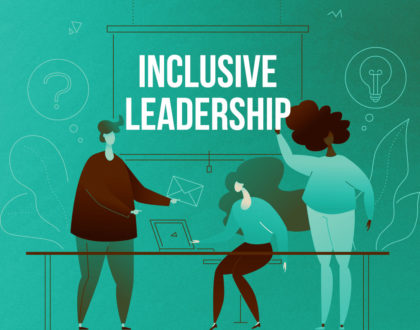4 ways to be a more inclusive leader

“Inclusive leadership is essential for achieving success in our increasingly diverse world, marketplace and workplace.”
– Juliette Mayers, LeadBoston ‘98
Improving diversity and inclusion within an organization requires a team effort. DE&I experts stress the importance of organizational buy-in. Leadership, in particular, should be open to changes within the organization. Executive leadership and management can sometimes pose as gatekeepers to organizational change. Therefore, it’s essential for influential leaders to assess the inclusivity of their leadership. Inclusive leaders can become change agents and are a key element of successful diversity, equity, and inclusion efforts. Fostering inclusive leadership means that your organization is committed to seeking diverse viewpoints, particularly when it comes to decision making.
But what exactly is an inclusive leader? How does one become an inclusive leader and how can individuals assess their own leadership skills?
The journey towards inclusive leadership looks different for everyone. During our 10-month LeadBoston program, participants explore and learn how to address barriers to inclusion through facilitated dialogue, expert speakers, and peer learning. LeadBoston develops inclusive leaders by building skills that enable individuals to analyze root causes
of diversity, equity, and inclusion challenges faced by their organizations and communities, then devise interventions that address those challenges. Inclusive leaders who have graduated from our LeadBoston program:
1. Value and leverage all points of view in order to make better decisions
Groupthink can stifle innovation, decision making, and hurt a company’s bottom line. A leader’s ability to leverage diverse viewpoints can become one of their most critical skills. Through improved collaboration and strategic decision making, inclusive leaders can positively impact business performance, professional development, and employee engagement within their organizations. Not only do diverse teams perform better, but there is also a penalty for less diverse companies.
2. Build the courage to challenge assumptions and practice accountability
Inclusive leaders tolerate risk and are willing to be the first to speak up in favor of changes within an organization. It takes courage to challenge the status quo and hold the organization, others, and ourselves accountable. Courageous leaders should practice self-awareness and regulation in order to lean into discomfort and address their own biases and limitations.
3. Are committed to intentionally creating more inclusive spaces
When an organization is inclusive, all members feel valued, respected, and confident in speaking up and being heard. An inclusive space makes everyone feel like they belong. Improving inclusivity requires a long-term commitment and intentional effort. This means that inclusive leaders should adapt their practices and allocate resources towards improving diversity and inclusion. By aligning DE&I efforts to personal values and business priorities, inclusive leaders can ensure lasting impact.
4. Analyze root causes before taking action
A systems approach, such as the iceberg model, can allow leaders to be more effective and inclusive problem solvers. The iceberg model looks at the various elements within a system that can influence each other. During YW Boston’s LeadBoston program, we challenge participants to critically assess challenges in order to differentiate between symptoms and root cause. This approach provides both the knowledge and the tools that allow leaders to identify attitudes, beliefs, and behaviors that may be reinforcing barriers to diversity, equity, and inclusion.

______
Interested in empowering employees who can respond to the increasing need for inclusive leaders and propel the organization’s success forward?
Become a part of YW Boston’s LeadBoston program and join a network of over 1,000 inclusive leaders in Boston. During this 10-month program, participants explore and learn how to address barriers to inclusion through facilitated dialogue, expert speakers, and peer learning. Through experiential activities, participants delve into the socioeconomic realities of Boston and explore innovative solutions to inequity.
Learn more about participating in our LeadBoston Class of 2020 by clicking here or by attending our upcoming September Info Session.
